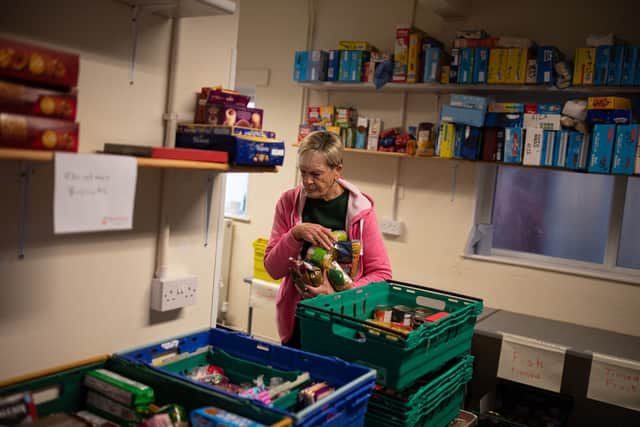Cost of living: More UK families relying on food donations ‘than ever’ with 1.1m parcels handed to children
This article contains affiliate links. We may earn a small commission on items purchased through this article, but that does not affect our editorial judgement.
and live on Freeview channel 276
More families in the UK are relying on food donations than ever before as the cost of living crisis continues. The Trussell Trust said that almost three million food parcels have been distributed over the past year - 37 per cent more than the previous year.
A total of 1.1 million of the food parcels were provided to children. Emma Revie, The Trussell Trust’s chief executive, said it was the first time the charity had handed out more than one million parcels to children, adding it was “an awful first to have”.
Advertisement
Hide AdAdvertisement
Hide AdShe added; "The level of need is even higher than we saw during the first year of the pandemic, which we all thought would be a record once-in-a-lifetime high.” In December 2022, the Trust gave out a food parcel “every eight seconds” on average.
According to the Trust’s annual report, more than three-quarters of a million people who received help had never before used one of its food banks before and one in five people referred to a food bank lived in a household where someone had a job.
The charity provided emergency food from almost 1,650 centres across the UK last year, with demand increasing in all areas but especially in the north east and east of England, south west England and Wales.
The Trust is now calling for the basic level of Universal Credit to be increased so that the amount covers “essential costs”. Ms Revie said that neither the pandemic nor rocketing food and energy costs could explain spiralling demand over the past five years.
Advertisement
Hide AdAdvertisement
Hide Ad"It is ongoing low levels of income and a social-security system that isn’t fit for purpose that are forcing more people to need food banks," she went on. "Food banks were set up to provide short-term support to people in an emergency - they are not a lasting solution to hunger and poverty.
“For too long people have been going without because social-security payments do not reflect life’s essential costs - and people are being pushed deeper into hardship as a result."


A spokesperson for the Department for Work and Pensions said: "We are committed to eradicating poverty and we recognise the pressures of the rising cost of living, which is why we have uprated benefits by 10.1% as well as making an unprecedented increase to the National Living Wage this month.
"We are also providing record levels of direct financial support for the most vulnerable - £1,200 last year and a further £1,350 in 2023-24."
Comment Guidelines
National World encourages reader discussion on our stories. User feedback, insights and back-and-forth exchanges add a rich layer of context to reporting. Please review our Community Guidelines before commenting.
